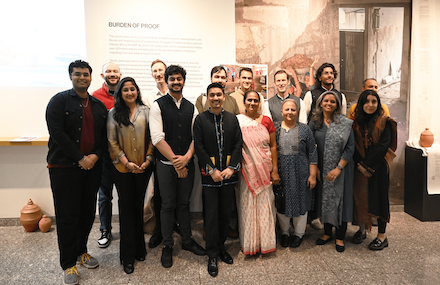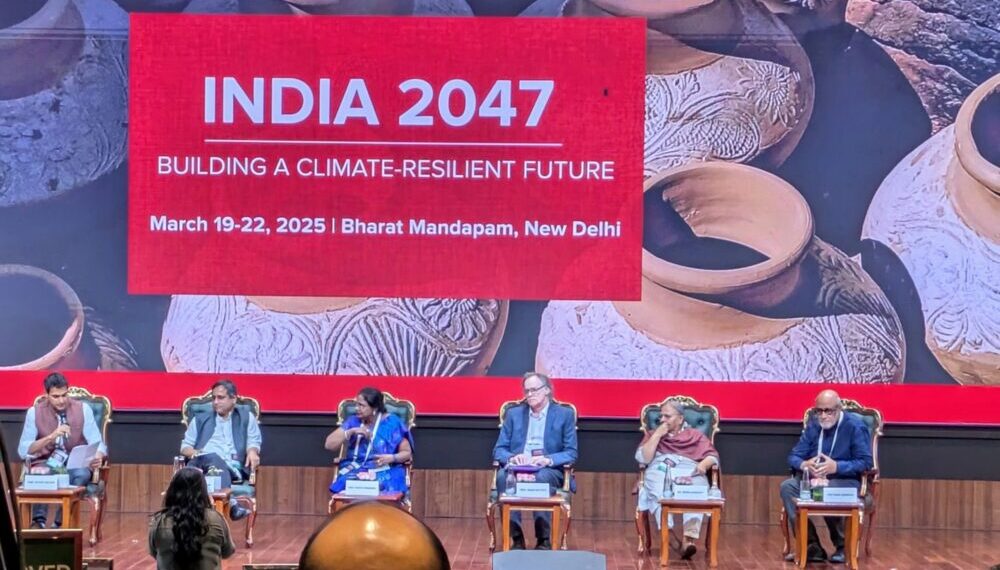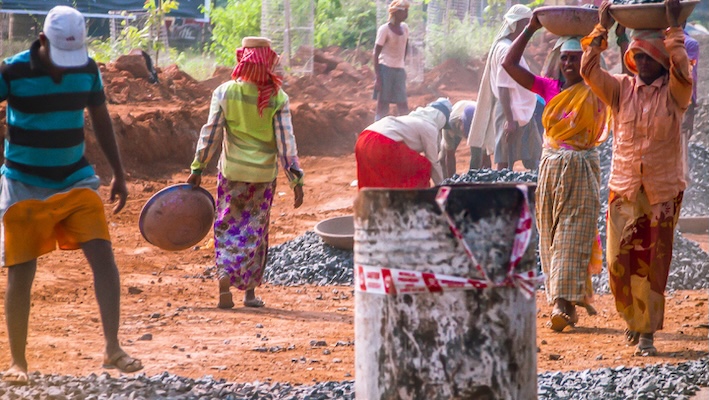The COVID-19 pandemic exposed the low trust in expert scientific opinion in many communities around the world. In our commitment to bridging information asymmetries, we engage with a range of public communication tools that have included frequent op-eds, podcasts, and informational webinars.
In 2024, we launched Hum Sab Ek, a traveling multimedia exhibition curated in close collaboration with women workers from India’s informal labor economy. We work with students from the medical sciences, government, engineering, and design.
Projects

Hum Sab Ek
Hum Sab Ek is an immersive exhibit inspired by the actions of members of the Self-Employed Women’s Association (SEWA), which comprises 3 million women working in India’s informal sector. In 2022, Dr. Balsari’s team studied SEWA’s response to the pandemic’s impact on its members, conducting 30 hours of oral histories and a survey of over 1,000 households.
Designed by an interdisciplinary team of graduate students working with SEWA, this exhibit was first hosted at Harvard, then at the Clinton Global Initiative in New York. It is now traveling across the U.S. before heading to Europe and India.
Podcasts
Community-Acquired Pneumonia in Resource-Limited Settings
August 2, 2024 | Community Science Alliance Podcast, Episode 1
India In-Focus Series
2022 | COVID-19 Podcast Series, The Lakshmi Mittal and Family South Asia Institute
In this special seven-part mini-series, Dr. Satchit Balsari explores India’s response to the COVID-19 pandemic, one year after the nationwide lockdown began.
Through conversations with experts across industries, the series examines key challenges, societal impacts, and lessons learned, offering a narrative-driven analysis of India’s evolving public health strategies and the road ahead.
Public Service Announcements
Garmi: An informational video on heat stroke awareness and protection
December 8, 2023 | The Lakshmi Mittal and Family South Asia Institute’s Climate Platform & the Community Science Alliance
As part of its efforts to promote scientifically sound, community-centered dialogues on climate change and adaptation, the Mittal Institute’s Climate Platform, in collaboration with the Community Science Alliance and the National Foundation of India, produced an informational video on heat stroke awareness and protection. Given that a significant portion of India’s labor force worked in the informal economy without legal or financial protections from extreme weather, the video aimed to raise awareness and encourage preventive measures.
Available in Hindi and Kannada, it was broadcast nationally across mainstream and social media channels in anticipation of summer 2024 and screened at COP28 in November 2023.
Events & Webinars
India 2047: Building a Climate-Resilient Future
March 19-22, 2025 | Salata Insitute for Climate and Sustainability, The Lakshmi Mittal South Asia Institute, The Ministry of Environment, Forests & Climate Change, Government of India
‘India 2047: Building a Climate-Resilient Future’ brought together experts in climate science, public health, medicine, labor, business, agriculture, and urban planning for a series of interdisciplinary dialogues on advancing climate resilience.
Experts included those in government, academia, civil society, and the private sector, whose conversations sought to shape actionable research and policy frameworks for a sustainable and climate-resilient future.
Too Hot To Work? What Would Climate Adaptation Look Like For India’s Labor Force?
February 20, 2025 | Amrita University
The Amrita Centre for International Programs hosted an Online Distinguished Talk with Dr. Satchit Balsari.
Dr. Balsari shared findings from his research on climate adaptation in India, focusing on how extreme heat is affecting the country’s workforce. He discussed the health risks faced by outdoor and informal workers, the economic impact of rising temperatures, and strategies to build resilience through policy, workplace innovations, and public health interventions.
How hot is it really? Who decides?
February 26, 2025 | Harvard T.H. Chan School of Public Health
In this session, Dr. Satchit Balsari shared insights from research at the Salata South Asia Climate Adaptation Cluster, tracking heat exposure among workers in collaboration with the Self Employed Women’s Association.
Using microsensors, biosensors, and biomarkers, the study quantifies the impact of extreme heat on laborers, highlighting the urgent need for adaptation strategies.
Hum Sab Ek panel discussion and guided tour
January 8, 2025 | World Bank
This panel discussion explored the experiences of India’s informal women workers during the COVID-19 pandemic, as showcased in the Hum Sab Ek exhibition.
Featuring members of the Self Employed Women’s Association (SEWA), the discussion highlighted the role of collective organizing in economic resilience. Panelists examined key lessons in labor rights, gender equity, and cooperative movements, emphasizing the need for community-centered development strategies.
The Audacity of Accompaniment
November 19, 2024 | Partners in Health
Dr. Satchit Balsari joined the Accompaniment in Teaching and Research panel to discuss how accompaniment is integrated into academia to shape the next generation of global health leaders.
Panelists explored how teaching and research initiatives foster patient-centered care, advocacy, and policy change, ensuring global health efforts remain equitable, sustainable, and community-driven.
Satchit Balsari on Hurricanes & Human Health
October 24, 2024 | The Salata Institute for Climate and Sustainability
In this discussion with The Salata Institute at Harvard University, Dr. Satchit Balsari explores the health impacts of hurricanes, the role of public health officials in disaster preparedness, and how technology is improving response efforts.
He highlights how CrisisReady’s situation reports leveraged novel data streams to track evacuation trends and evolving displacement patterns during Hurricane Milton, underscoring the need for data-driven approaches to disaster response and recovery.
Harvard at Climate Week NYC
September 24, 2024 | The Salata Institute for Climate and Sustainability
As part of Climate Week NYC, The Salata Institute for Climate and Sustainability at Harvard University hosted three expert panels through its Climate Action Accelerator program.
Moderated by Dr. Satchit Balsari, this panel brought together Harvard faculty in medicine, public health, and law, alongside experts and leaders from domestic and global labor movements, to discuss the impact of rising global temperatures on workers’ health, livelihoods, and productivity. Panelists examined occupational risks, policy gaps, and necessary interventions to protect vulnerable workers in an increasingly hot world.
Understanding the Impact of Extreme Heat
July 25, 2024 | The Lakshmi Mittal and Family South Asia Institute
This webinar, hosted by The Mittal Institute at Harvard University, discusses the real-world effects of extreme heat, particularly on informal workers in South Asia. Speakers discussed how rising temperatures disrupt labor productivity, health, and economic stability, as well as current and proposed responses to protect vulnerable populations.
Moderated by Dr. Satchit Balsari, the session explored the urgent need for policies and interventions to mitigate the growing risks of heat stress in the region.
The Science of Extreme Heat
July 18, 2024 | The Lakshmi Mittal and Family South Asia Institute
This webinar, hosted by The Mittal Institute at Harvard University, examined the science behind extreme heat, covering heatwave prediction, health impacts, and the effectiveness of India’s Heat Action Plans. As heatwaves intensify globally, speakers highlighted the need for better forecasting and adaptation strategies.
Moderated by Dr. Satchit Balsari, the session explored gaps in current response frameworks and the growing risks to public health, labor, and agriculture.
When Poor Women Workers Drive the Research Agenda
June 28, 2024 | The Harvard Global Health Institute (HGHI)
In this HGHI Coffee Session, Self Employed Women’s Association (SEWA) members Manshi Shah and Kapilaben Vankar, in conversation with Dr. Satchit Balsari, discuss SEWA’s long history of academic partnerships and community-driven research.
They highlight how SEWA’s members are shaping climate adaptation efforts, including a traveling exhibition and the first parametric insurance product to protect wages during extreme heat.
The session explores how worker-led research can inform policy and innovation.
Inside the Hum Sab Ek Exhibition
May 3, 2024 | The Lakshmi Mittal and Family South Asia Institute
As part of the Mittal Institute’s Annual Cambridge Symposium 2024, this session explored the Hum Sab Ek (We Are One) exhibition and its focus on women workers’ experiences and research-driven storytelling.
Moderated by Dr. Satchit Balsari, the discussion featured SEWA Secretary-General Jyoti Macwan and Harvard graduate students who contributed to the exhibition. Panelists shared insights into the creative and academic processes behind the project, highlighting its impact on policy, advocacy, and cross-disciplinary collaboration.
Hum Sab Ek (We Are One) Exhibition Opening
April 15, 2024 | The Lakshmi Mittal and Family South Asia Institute
In the Spring of 2024, The Mittal Institute launched the Hum Sab Ek (We Are One) multi-media exhibition at Harvard University. The opening event featured project leader and curator Dr. Satchit Balsari, alongside members of the curatorial team, representatives from the Self Employed Women’s Association (SEWA), and global experts.
Speakers highlighted the role of women workers in shaping research and policy, as well as the exhibition’s mission to amplify their voices and experiences.
Op-Eds
The Salata Institute for Climate and Sustainability
India 2047: Key Learnings Summarized by the Scientific CommitteeMarch 22, 2025
The Harvard Gazette
At India Climate Conference, Harvard’s South Asia ties take center stageMarch 19, 2025
Harvard Center for International Development
Empowering Women in the Informal Economy: Insights from SEWA's Community-Driven Approach in IndiaMarch 18, 2025
The Salata Institute for Climate and Sustainability
Harvard professors simulate and study Phoenix heat emergencyMarch 13, 2025
Nature
Local government actions can curb air pollution in India and PakistanOctober 23, 2024
PLOS Digital Health
A standardised differential privacy framework for epidemiological modeling with mobile phone dataOctober 27, 2023
American Journal of Public Health
Wildfire Threat to Inpatient Health Care Facilities in CaliforniaApril 5, 2023
The Journal of Climate Change and Health
CrisisReady's novel framework for transdisciplinary translationDecember 15, 2022
The New England Journal of Medicine
Data in Crisis — Rethinking Disaster Preparedness in the United StatesSeptember 1, 2021
The Daily Star, Bangladesh
Covid-19 Response: Creating a lasting legacy of collaboration across South AsiaJune 17, 2021
The New England Journal of Medicine
Mortality in Puerto Rico after Hurricane MariaInterviews
Resilience in Action:
Empowering India’s Informal Workers Through Crisis and Adaptation
November 26, 2024 | Harvard Advanced Leadership Initiative, Social Impact Review
In this interview, Dr. Satchit Balsari discusses his work with India’s Self-Employed Women’s Association (SEWA) and its “economy of nurturance,” highlighting community-driven resilience strategies for survival and adaptation.
He emphasizes the importance of interdisciplinary collaboration, local innovation, and data-informed policies in addressing complex global challenges, advocating for solutions that are both context-specific and scalable.
Publications
Published Research & Academic Contributions
Explore Dr. Satchit Balsari’s body of research, spanning global health, digital health innovation, disaster response, and climate resilience. His work focuses on data-driven policy solutions, health system preparedness, and community-centered approaches to addressing complex public health challenges.
Browse his published studies, articles, and contributions through the links below.

